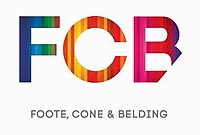Loading AI tools
Global advertising agency network From Wikipedia, the free encyclopedia
Foote, Cone & Belding (FCB) is one of the largest global advertising agency networks.[2] It is owned by Interpublic Group and was merged in 2006 with Draft Worldwide, adopting the name Draftfcb. In 2014 the company rebranded itself as FCB.[3]
 | |
| Company type | Subsidiary |
|---|---|
| Industry | Advertising |
| Genre | Advertising agency |
| Founded | 1873 (as Lord & Thomas) |
| Headquarters | |
Number of locations | 90 countries |
Area served | Worldwide |
Key people | Susan Credle[1] Global Chairperson & Global Chief Creative Officer Tyler Turnbull[1] Global CEO |
| Services | Marketing communications |
Number of employees | 8,653 |
| Parent | Interpublic Group of Companies |
| Website | www.fcb.com |
Parent Interpublic Group is one of the big four agency holding conglomerates, the others being Publicis, WPP, and Omnicom.
Founded by Daniel Lord and Ambrose Thomas as Lord & Thomas in Chicago in 1873, FCB is the third-oldest advertising agency in the U.S. still operating today. Albert Lasker began work for the firm as a clerk in 1898, working his way up until he purchased it in 1912. Chicago and New York were centers of the nation's advertising industry at the time, and Lasker, known as the "father of modern advertising," made Chicago his base from 1898 to 1942. When the agency acquired the Sunkist Growers, Incorporated account, the citrus industry was in a slump with an excess of produce. Lasker helped increase the consumption of oranges by creating a new market with his "Drink an orange" ads.[4] Lasker's use of radio, particularly with his campaigns for Palmolive soap, Pepsodent toothpaste, Kotex feminine hygiene products, and Lucky Strike cigarettes, not only revolutionized the advertising industry but also significantly changed popular culture.[5][4]
In 1942, Lasker sold Lord & Thomas to its three top managers, Emerson H. Foote in New York City, Fairfax Cone in Chicago, and Don Belding in California; they renamed it Foote Cone & Belding.[6][4]
In 1963, Foote, Cone & Belding began to offer stock and went public.[7] FCB began to expand in Europe that year.
In the 1970s and '80s major clients included Mazda, RJR Nabisco, AT&T, Coors Brewing Company, Payless ShoeSource and Mattel. In the 1980s, the agency began an international expansion.
In December 1994, FCB created a new holding company, True North Communications, to become a major multinational player.[8]
In 2000, it had more than 190 offices serving clients in 102 countries.[citation needed]
In 2001, ad network Interpublic Group acquired True North Communications.[8]
Draft Direct Worldwide and FCB merged in June 2006, to form Draftfcb. Less than a year after the merger, in April 2007, Kmart switched its $740 million account from Grey New York to Draftfcb Chicago without a pitch.[9]
On 10 March 2014, the agency was renamed as FCB, six months after the appointment of worldwide CEO Carter Murray.[10]
In 2016, Susan Credle joined the agency as Global Chief Creative Officer.[11]
In 2019, Ad Age named FCB to its 2019 A-List and FCB/SIX earns Data/Analytics Agency of the Year.[12]
The agency and its work have been recognized at a number of award competitions—Cannes, The One Show, and industry competitions Echoes, El Ojo, Effies, and Caples—as well as agency-of-the-year honors for its New Zealand,[13] Indonesia,[14] and Durban[15] São Paulo, Mexico City and Kuwait offices. Its Canada office has won digital agency-of-the-year in four consecutive years starting in 2016.[16][17]
FCB received The One Club award in 2017 and 2018 from The One Club.[53]
FCB Media initiated a marketing campaign called Bully Hunters which consisted of a livestream event held in mid-April 2018 which aimed to combat misogynist harassment in video games by deploying "bully hunters" to kill abusive opponents in the game Counter-Strike: Global Offensive. The livestream itself consisted of pre-recorded footage of faked harassment as acted out by associates of FCB Media.
Claimed sponsors of the event included SteelSeries, Vertagear, CyberPowerPC, the Diverse Gaming Coalition, and the National Organization for Women.
SteelSeries considered the campaign to be damaging to their brand and misrepresented the level of SteelSeries involvement.[58] The company released a statement stating that the way Bully Hunters represented the gaming community was wrong and disingenuous, adding stating that SteelSeries was not involved in the management of the event and did not pay FCB Media to produce it.[59] A CyberPowerPC representative stated "What they told us was completely [different?] than the way they executed it" and that they felt misled.[60]
Brandon Cooke, FCB's global chief communications officer, told Polygon "As this effort did not live up to our high standards, we decided to end this program, but hope the conversation it has raised around ending harassment in gaming continues".[61]
By the end of the campaign all claimed sponsors had withdrawn their support.[62][63]
Seamless Wikipedia browsing. On steroids.
Every time you click a link to Wikipedia, Wiktionary or Wikiquote in your browser's search results, it will show the modern Wikiwand interface.
Wikiwand extension is a five stars, simple, with minimum permission required to keep your browsing private, safe and transparent.